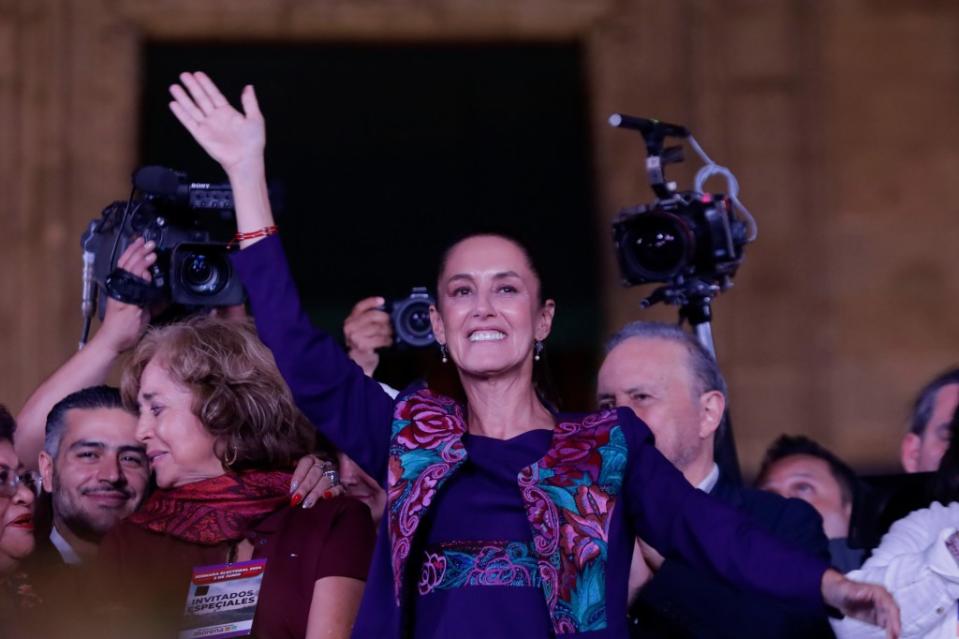Mexico elects its first female president. How the country got here before the U.S.
Good morning, Broadsheet readers! The Texas Supreme Court strengthens abortion ban with limits on exceptions, Female Founders Fund's Anu Duggal marks a decade of investing in women's health, and Mexico elects its first female president. Have a mindful Monday.
- Results are in. Mexico's voters went to the polls yesterday, where they elected the country's first female president. Candidate Claudia Sheinbaum is projected to win in a landslide with between 58.3% and 60.7% of the vote. The result, experts say, speaks to the power of Mexico's ruling Morena party, which will have a major congressional majority as Sheinbaum succeeds her mentor, outgoing President Andrés Manuel López Obrador.
But for months, it's been clear that Mexico was poised to elect a female leader. Sheinbaum and Xóchitl Gálvez, both 61, were the only two serious candidates in the race. Sheinbaum was the frontrunner, a climate scientist and the former mayor of Mexico City. Gálvez, a former senator and businesswoman, led a coalition of opposition parties.
“I am also grateful because, for the first time in 200 years of the republic, I will become the first woman president of Mexico," Sheinbaum said in her victory speech. She's also the first Jewish leader of the largely Catholic country, which was not a major point of discussion during the campaign.

Women have led several countries throughout Latin America, but Mexico has until now been governed by men; women got the right to vote in 1953. The New York Times has a fascinating analysis into how Mexico got here—and did so before the U.S. The answer is that the country didn't just wait for voters to slowly, naturally enact progress. A strong "macho" culture has slowly been eroded in politics by a series of reforms that helped elect women to political office. Over several decades, Mexico adopted laws that encouraged representation for women in politics. Then, in 2019, the country made gender parity in all three branches of government a constitutional requirement. Feminist activists pushed for those changes—alongside decades of activism against gender-based violence and femicide.
So Mexico's election results are a strong argument that waiting for progress to just happen, well, doesn't work. Indeed, the election of a female president "could not have happened if it had not been for parity" the leader of a group that trains women for office in Mexico told the Times. Half of Mexico's legislature is female, compared to 30% of the U.S. Congress, the Times points out.
Gender-based quotas for public officeholders are not uncommon globally, although the U.S. has never gotten close to enacting any. The American electoral college makes electing a female leader trickier, too.
Mexico continues to struggle with gender-based violence and femicide; Three thousand women were killed in cases considered femicide in 2023, according to UN Women. As mayor of Mexico City, Sheinbaum instituted reforms including an anti-femicide prosecutor's office that she's said she aims to replicate nationally. Meanwhile, Mexico has mainly decriminalized abortion over the past two years (though challenges in accessibility remain) while the U.S. trends in the opposite direction; the issue was not a major topic throughout the presidential campaign.
Voters were cautiously optimistic a female president would take a stronger stance on these life-and-death issues. As Gálvez said before the election: "This is not the time for men."
Emma Hinchliffe
emma.hinchliffe@fortune.com
The Broadsheet is Fortune's newsletter for and about the world's most powerful women. Today's edition was curated by Joseph Abrams. Subscribe here.
This story was originally featured on Fortune.com

 Yahoo Finance
Yahoo Finance 